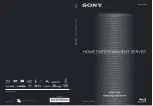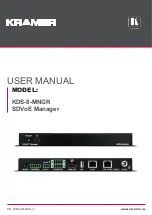
Running Standalone Diagnostics from a Network Installation
Management (NIM) Server
A client system connected to a network with a Network Installation Management (NIM) server can boot
standalone diagnostics from the NIM server if the client-specific settings on both the NIM server and client
are correct.
Notes:
1. All operations to configure the NIM server require root user authority.
2. If you replace the network adapter in the client, the network-adapter hardware-address settings for the
client must be updated on the NIM server.
3. The
Cstate
for each standalone diagnostics client on the NIM server should be kept in the
diagnostic
boot has been enabled
state.
4. On the client system, the NIM server network adapter should be put in the bootlist after the boot disk
drive. This allows the system to boot in standalone diagnostics from the NIM server if there is a
problem booting from the disk drive. For information about setting the bootlist, see the
Multiboot
section under “SMS” in the client system’s service guide.
NIM Server Configuration
Refer to the “Advanced NIM Configuration Tasks” chapter of the
AIX Installation Guide and Reference
,
order number SC23-4389, for information on doing the following:
v
Registering a client on the NIM server
v
Enabling a client to run diagnostics from the NIM server
Documentation for the AIX operating system is available from the IBM
Eserver
pSeries Information
Center at http://publib16.boulder.ibm.com/pseries/en_US/infocenter/base. Select
AIX documentation
. The
AIX Documentation
CD contains the base set of publications for the operating system, including
system-management and end-user documentation.
To verify that the client system is registered on the NIM server and the diagnostic boot is enabled, run the
lsnim -a Cstate -Z
ClientName
command from the command line on the NIM server. Refer to the
following table for system responses.
Note:
The
ClientName
is the name of the system on which you want to run standalone diagnostics.
System Response
Client Status
#name:Cstate:
ClientName:diagnostic boot has been
enabled:
The client system is registered on the NIM server and
enabled to run diagnostics from the NIM server.
#name:Cstate:
ClientName:ready for a NIM operation:
or
#name:Cstate:
ClientName:BOS installation has been
enabled:
The client is registered on the NIM server but not enabled
to run diagnostics from the NIM server.
Note:
If the client system is registered on the NIM server
but Cstate has not been set, no data will be returned.
0042-053 lsnim: there is no NIM object
named "ClientName"
The client is not registered on the NIM server.
360
Eserver
pSeries 630 Model 6C4 and Model 6E4 Service Guide
Summary of Contents for @Server pSeries 630 6C4
Page 1: ...pSeries 630 Model 6C4 and Model 6E4 Service Guide SA38 0604 03 ERserver...
Page 2: ......
Page 3: ...pSeries 630 Model 6C4 and Model 6E4 Service Guide SA38 0604 03 ERserver...
Page 16: ...xiv Eserver pSeries 630 Model 6C4 and Model 6E4 Service Guide...
Page 18: ...xvi Eserver pSeries 630 Model 6C4 and Model 6E4 Service Guide...
Page 382: ...362 Eserver pSeries 630 Model 6C4 and Model 6E4 Service Guide...
Page 440: ...420 Eserver pSeries 630 Model 6C4 and Model 6E4 Service Guide...
Page 538: ...System Parts continued 518 Eserver pSeries 630 Model 6C4 and Model 6E4 Service Guide...
Page 541: ...Chapter 10 Parts Information 521...
Page 562: ...542 Eserver pSeries 630 Model 6C4 and Model 6E4 Service Guide...
Page 568: ...548 Eserver pSeries 630 Model 6C4 and Model 6E4 Service Guide...
Page 576: ...556 Eserver pSeries 630 Model 6C4 and Model 6E4 Service Guide...
Page 580: ...560 Eserver pSeries 630 Model 6C4 and Model 6E4 Service Guide...
Page 616: ...596 Eserver pSeries 630 Model 6C4 and Model 6E4 Service Guide...
Page 646: ...626 Eserver pSeries 630 Model 6C4 and Model 6E4 Service Guide...
Page 649: ......















































